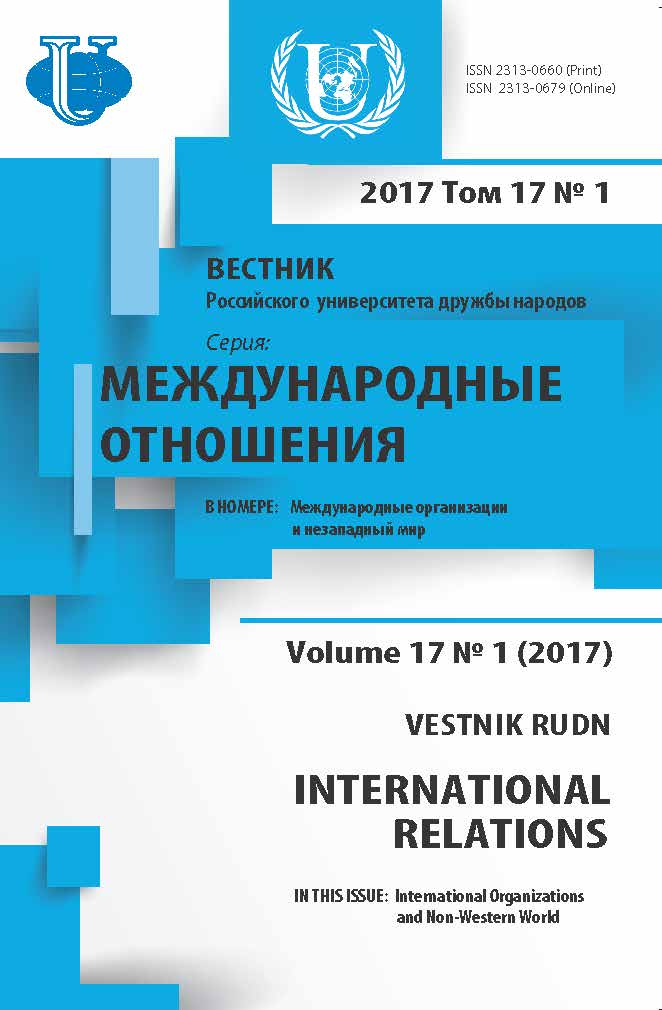De-stalinisation of soviet foreign policy towards Indonesia: reviewing the feasibility of the theory of foreign policy change
- Authors: Dharmaputra R.1
-
Affiliations:
- Universitas Airlangga
- Issue: Vol 17, No 1 (2017): International organizations and Non-Western World
- Pages: 162-174
- Section: HISTORY OF INTERNATIONAL RELATIONS
- URL: https://journals.rudn.ru/international-relations/article/view/15886
- DOI: https://doi.org/10.22363/2313-0660-2017-17-1-162-174
Cite item
Full Text
Abstract
This paper re-evaluates the changing policies of the Soviet Union towards Indonesia during the era of Joseph Stalin and Nikita Khrushchev, by applying the contemporary theory of foreign policy change. After discussing the debates revolving around the theory of foreign policy change from Gustavsson and Hermann, this paper contends that if there were any changes, then the causal factors would likely be the interplay between the domestic factors and international factors, as Putnam has argued. This finding enhances the understanding that the domestic de-Stalinisation process undergone during Khrushchev’s era was not the only factor that might affect Soviet’s foreign policy. By using the case of Indonesia as the representation of the developing countries, the author shows that both sets of factors affected the changing policy. However, author also found that the systemic condition of the Cold War, namely the contestation between the US and USSR, was more influential than the domestic condition. This paper contributes to the deeper understanding of Soviet-Indonesia relations, the effect of domestic de-Stalinisation to foreign policy, and the feasibility of applying current theory of foreign policy change to an historical case.
About the authors
Radityo Dharmaputra
Universitas Airlangga
Email: radityo.dharmaputra@fisip.unair.ac.id
Surabaya, Indonesia
References
- Armstrong, J. A. (1965). The Domestic Roots of Soviet Foreign Policy. International Affairs (Royal Institute of International Affairs), 41(1), 37-47
- Boden, R. (2007). The 'Gestapu' events of 1965 in Indonesia: New evidence from Russian and German archives. Bijdragen tot de Taal-, Land- en Volkenkunde, 163 (4), 507-528
- Boden, R. (2008). Cold War Economics: Soviet Aid to Indonesia. Journal of Cold War Studies, 10 (3), 110-128. doi: 10.1162/jcws.2008.10.3.110
- Derkach, N. (1965). The Soviet Policy towards Indonesia in the West Irian and the Malaysian Disputes. Asian Survey, 5 (1), 566-571
- Efimova, L. M. (1998). Towards the establishment of diplomatic relations between the USSR and the republic of Indonesia, 1947-48. Indonesia and the Malay World, 26 (76), 184-194
- Efimova, L. M. (2001). New evidence on the establishment of Soviet-Indonesian diplomatic relations (1949-1953). Indonesia and the Malay World, 29 (85), 215-233
- Efimova, L. M. (2009). Did the Soviet Union Instruct Southeast Asian Communists to Revolt? New Russian Evidence on the Calcutta Youth Conference of February 1948. Journal of Southeast Asian Studies, 40 (3), 449-469
- Eidenfalk, J. (2006). Toward a New Model of Foreign Policy Change. Paper presented at Australasian Political Studies Association conference, September, University of Newcastle
- Eidenfalk, J. (2009). A Window of Opportunity? Australian Foreign Policy Change towards East Timor 1998-1999 and Solomons Island 2003. PhD Dissertation, School of History and Politics, Faculty of Arts, University of Wollongong
- Gati, C. (1980). The Stalinist legacy in Soviet foreign policy. In: E. P. Hoffman & F. J. Fleron. editors. The Conduct of Soviet Foreign Policy. New York: Aldine. p. 644-663
- Gehlen, M. P. (1967). The Politics of Coexistence - Soviet Methods and Motives. Westport, CT: Greenwood
- Goldman, M. I. (1965). A Balance Sheet of Soviet Foreign Aid. Foreign Affairs, 43(2), 349-360
- Gustavsson, J. (1999). How Should We Study Foreign Policy Change. Cooperation and Conflict, 34 (1), 73-95
- Hermann, C. (1990). Changing course: When government choose to redirect foreign policy. International Studies Quarterly, 34 (1), 3-21
- Horn, R. (1975). Soviet Influence in Southeast Asia: Opportunities and Obstacles. Asian Survey, 15 (8), 656-671
- Jones, S. B. (1955). Global Strategic Views. Geographical Review, 45 (4), 492-508
- Pauker, G. J. (1961). General Nasution's Mission to Moscow. Asian Survey, 1 (1), 13-22
- Pauker, G. J. (1962). The Soviet Challenge in Indonesia. Foreign Affairs, 40 (4), 612-626
- Pospielovsky, D. (1968). Restalinization or Destalinization? Russian Review, 27 (3), 307-320
- Putnam, R. (1988). Diplomacy and Domestic Politics: The Logic of Two-Level Games. International Organization, 42 (3), 427-460
- Sidel, J. T. (2007). From Russia with Love? A Book Review of Stalin i Indonyeziya: Politika SSSR v otnoshenii Indonyezii v 1945-1953 godakh: Nyeizvyestniye Stranitsiy [Stalin and Indonesia: Soviet Policy towards Indonesia, 1945-1953: Unknown Pages] by L.M. Efimova. Indonesia, 84, 161-172
- Singh, B. (1986). Soviet-Indonesian Relations, 1945-1968. PhD Dissertation, Australian National University
- Tucker, R. D. (1957). The Politics of Soviet De-Stalinization. World Politics, 9 (4), 550-578
- Williams, M. C. (1991). New Soviet Policy toward Southeast Asia: Reorientation and Change. Asian Survey, 31(4), 364-377











